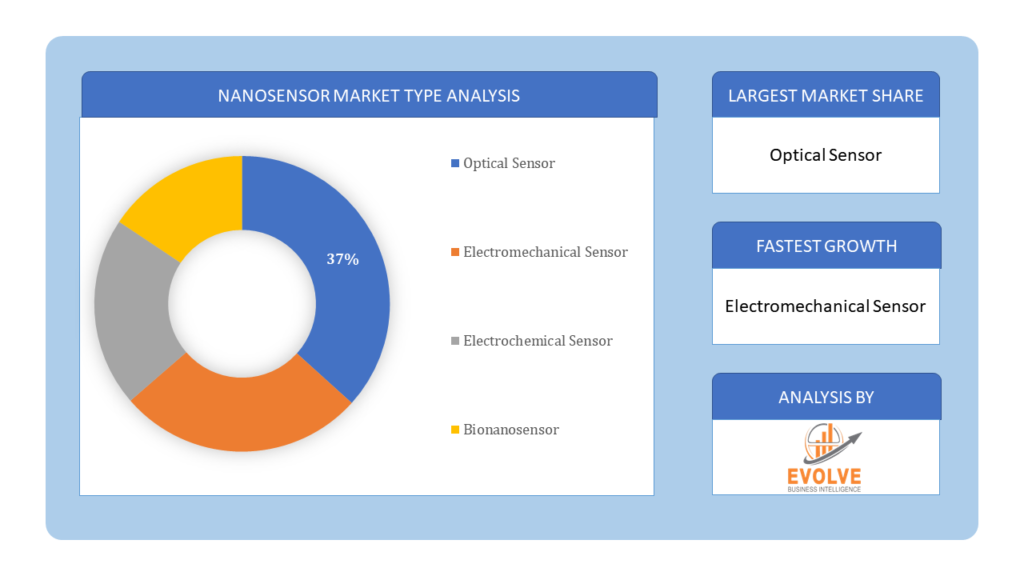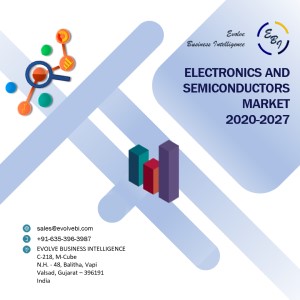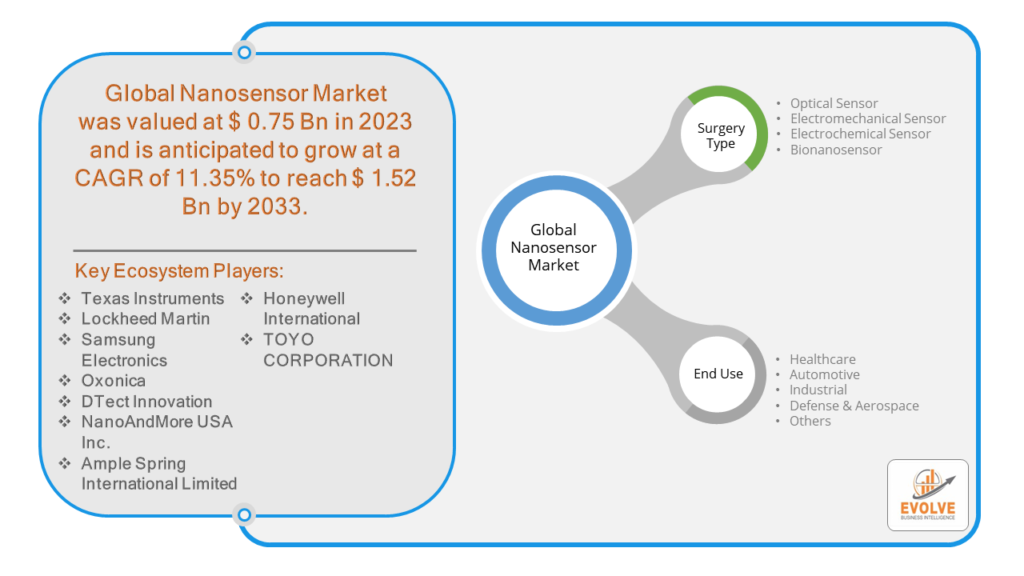Global Nanosensor Market Analysis and Global Forecast 2020-2027
$ 1,390.00 – $ 5,520.00Price range: $ 1,390.00 through $ 5,520.00
Nanosensor Market Research Report: Information By Type (Optical Sensor, Electromechanical Sensor, Electrochemical Sensor, and Bionanosensor) By Industry Vertical (Healthcare, Automotive, Industrial, Defense & Aerospace, and Others), and by Region — Forecast till 2033.
Page: 134
Nanosensor Market Overview
The Nanosensor Market Size is expected to reach USD 1.52 Billion by 2033. The Nanosensor industry size accounted for USD 0.75 Billion in 2023 and is expected to expand at a compound annual growth rate (CAGR) of 11.35% from 2023 to 2033. The nanosensor market is a rapidly expanding sector within the broader field of nanotechnology, focusing on the development and Industry Vertical of nanoscale sensors. These sensors utilize nanomaterials and nanotechnology principles to detect and measure various physical, chemical, or biological properties with high sensitivity and precision. They find extensive use in industries such as healthcare, environmental monitoring, food safety, and security. Advancements in nanofabrication techniques have enabled the Typeion of nanosensors that are smaller, more efficient, and cost-effective.
Global Nanosensor Market Synopsis
The COVID-19 pandemic has significantly impacted the nanosensor market, driving demand for innovative solutions in diagnostics, monitoring, and research. Nanosensors are crucial in the development of rapid and sensitive detection methods for the virus, aiding in testing kits and biosensors. Furthermore, the pandemic has accelerated research and investment in nanotechnology for healthcare Industry Verticals, leading to a surge in demand for nanosensors for virus detection, vaccine development, and monitoring infectious diseases.
Nanosensor Market Dynamics
The major factors that have impacted the growth of Nanosensor are as follows:
Drivers:
Ø Advancements in Nanotechnology
Continuous advancements in nanotechnology have led to the development of more sophisticated and cost-effective nanosensor technologies. These advancements enable the fabrication of nanosensors with enhanced functionalities, improved sensitivity, and selectivity, driving their adoption across diverse Industry Verticals.
Restraint:
- Privacy and Data Security Risks
Nanosensors embedded in IoT devices and wearable technologies generate vast amounts of sensitive data about individuals’ behavior, health, and surroundings. Ensuring data privacy, security, and protection against cyber threats is crucial to gaining consumer trust and regulatory approval. Concerns regarding data breaches, unauthorized access, and misuse of personal information may dampen consumer adoption and regulatory support.
Opportunity:
⮚ Advancements in Nanomaterials and Fabrication Techniques
Ongoing research and development in nanomaterials and fabrication techniques are opening up new opportunities for designing nanosensors with enhanced performance, sensitivity, and functionality. Innovations such as 2D materials, quantum dots, and nanostructured surfaces offer exciting possibilities for next-generation nanosensor Industry Verticals in various industries.
Nanosensor Segment Overview
By Type
 Based on Type, the market is segmented based on Optical Sensor, Electromechanical Sensor, Electrochemical Sensor, and Bionanosensor. Because of their broad range of chemical and material detection capabilities, which make them ideal for usage in a variety of Industry Verticals like food and beverage testing, environmental monitoring, and medical diagnostics, the Electrochemical Nano sensor segment is expected to dominate.
Based on Type, the market is segmented based on Optical Sensor, Electromechanical Sensor, Electrochemical Sensor, and Bionanosensor. Because of their broad range of chemical and material detection capabilities, which make them ideal for usage in a variety of Industry Verticals like food and beverage testing, environmental monitoring, and medical diagnostics, the Electrochemical Nano sensor segment is expected to dominate.
By Industry Vertical
Based on Industry Verticals, the market has been divided into the Healthcare, Automotive, Industrial, Defense & Aerospace, and Others. Due to the increasing demand for portable, small, superior, and more accurate diagnostic sensing systems for patient-friendly diagnostics, the healthcare industry is projected to dominate the market for the duration of the forecast period.
Global Nanosensor Market Regional Analysis
Based on region, the global Nanosensor market has been divided into North America, Europe, Asia-Pacific, the Middle East & Africa, and Latin America. North America is projected to dominate the use of the Nanosensor market followed by the Asia-Pacific and Europe regions.
 Nanosensor North America Market
Nanosensor North America Market
North America holds a dominant position in the Nanosensor Market. The region’s dominance can be attributed to various factors. The market is dominated by North America. North America is home to numerous top nanosensors businesses and has a well-established technological industry. In addition, the region’s favorable legislative framework and strong demand for cutting-edge technology have encouraged large investments in the nanosensors industry’s R&D.
Nanosensor Asia-Pacific Market
The Asia-Pacific region has indeed emerged as the fastest-growing market for the Nanosensor industry. The Asia-Pacific nanosensor market is experiencing robust growth driven by factors such as increasing industrialization, rapid urbanization, and technological advancements across sectors. Countries like China, Japan, South Korea, and India are leading the market expansion with significant investments in research and development, particularly in healthcare, electronics, and automotive industries. Rising demand for IoT devices, smart infrastructure, and environmental monitoring solutions further fuels the adoption of nanosensors in the region. Additionally, government initiatives promoting innovation, along with supportive regulatory policies, are propelling market growth. The Asia-Pacific region is poised to become a key hub for nanosensor manufacturing, research, and commercialization, offering lucrative opportunities for both domestic and international players.
Competitive Landscape
The global Nanosensor market is highly competitive, with numerous players offering a wide range of software solutions. The competitive landscape is characterized by the presence of established companies, as well as emerging startups and niche players. To increase their market position and attract a wide consumer base, the businesses are employing various strategies, such as Type launches, and strategic alliances.
Prominent Players:
- OMRON Corporation
- Texas Instruments
- Lockheed Martin
- Samsung Electronics
- Oxonica
- DTect Innovation
- NanoAndMore USA Inc.
- Ample Spring International Limited
- Honeywell International
- TOYO CORPORATION
Key Development
August 2021: Omron has announced the release of the “VTS10 Series PCB Inspection System,” the industry’s first imaging and artificial intelligence technology that automates the electronic substrate inspection process, removing the need for specialized skills to meet the demands of fifth-generation mobile communications, electric vehicles, and autonomous driving.
September 2021: Texas Instruments announced a collaboration with Delta Electronics they release a technology that extends the power of Gallium Nitride (GaN) technology to Delta Electronics’ energy-efficient data center server power supply.
Scope of the Report
Global Nanosensor Market, by Type
- Optical Sensor
- Electromechanical Sensor
- Electrochemical Sensor
- Bionanosensor
Global Nanosensor Market, by Industry Vertical
- Healthcare
- Automotive
- Industrial
- Defense & Aerospace
- Others
Global Nanosensor Market, by Region
- North America
- US
- Canada
- Mexico
- Europe
- UK
- Germany
- France
- Italy
- Spain
- Benelux
- Nordic
- Rest of Europe
- Asia Pacific
- China
- Japan
- South Korea
- Indonesia
- Austalia
- Malaysia
- India
- Rest of Asia Pacific
- South America
- Brazil
- Argentina
- Rest of South America
- Middle East & Africa
- Saudi Arabia
- UAE
- Egypt
- South Africa
- Rest of Middle East & Africa
| Parameters | Indicators |
|---|---|
| Market Size | 2033: $1.52 Billion |
| CAGR | 11.35% CAGR (2023-2033) |
| Base year | 2022 |
| Forecast Period | 2023-2033 |
| Historical Data | 2021 |
| Report Coverage | Revenue Forecast, Competitive Landscape, Growth Factors, and Trends |
| Key Segmentations | Type , Industry Vertical |
| Geographies Covered | North America, Europe, Asia-Pacific, Latin America, Middle East, Africa |
| Key Vendors | OMRON Corporation, Texas Instruments, Lockheed Martin, Samsung Electronics, Oxonica, DTect Innovation, NanoAndMore USA Inc., Ample Spring International Limited, Honeywell International, TOYO CORPORATION. |
| Key Market Opportunities | • Reliance on modern devices for commercial and personal purposes |
| Key Market Drivers | • Rising trend of miniaturization and the application of miniaturized items all across numerous industries |
REPORT CONTENT BRIEF:
- High-level analysis of the current and future Nanosensor market trends and opportunities
- Detailed analysis of current market drivers, restraining factors, and opportunities in the future
- Nanosensor market historical market size for the year 2021, and forecast from 2023 to 2033
- Nanosensor market share analysis at each Type level
- Competitor analysis with detailed insight into its Type segment, Government & Defense strength, and strategies adopted.
- Identifies key strategies adopted including Type launches and developments, mergers and acquisitions, joint ventures, collaborations, and partnerships as well as funding taken and investment done, among others.
- To identify and understand the various factors involved in the global Nanosensor market affected by the pandemic
- To provide a detailed insight into the major companies operating in the market. The profiling will include the Government & Defense health of the company’s past 2-3 years with segmental and regional revenue breakup, Type offering, recent developments, SWOT analysis, and key strategies.
Press Release

Global Pharmaceutical Manufacturing Market to Reach $1.38 Trillion by 2035 with 7.35% CAGR, New Research Shows

The Global Mammography Market Is Estimated To Record a CAGR of Around 10.29% During The Forecast Period

Glue Stick Market to Reach USD 2.35 Billion by 2034

Podiatry Service Market to Reach USD 11.88 Billion by 2034

Microfluidics Technology Market to Reach USD 32.58 Billion by 2034

Ferric Chloride Market to Reach USD 10.65 Billion by 2034

Family Practice EMR Software Market to Reach USD 21.52 Billion by 2034

Electric Hairbrush Market to Reach USD 15.95 Billion by 2034

Daily Bamboo Products Market to Reach USD 143.52 Billion by 2034

Cross-border E-commerce Logistics Market to Reach USD 112.65 Billion by 2034
Frequently Asked Questions (FAQ)
What is the study period of the Nanosensor market?
The study period for the Nanosensor market extends from 2023 to 2033.
What is the growth rate of the Nanosensor market?
The Nanosensor market is expected to grow at a compound annual growth rate (CAGR) of 11.35% from 2023 to 2033, reaching an estimated value of USD 1.52 Billion by 2033.
Which region has the highest growth rate in the Nanosensor market?
The Asia-Pacific region emerges as the fastest-growing market for the Nanosensor industry, driven by increasing industrialization, rapid urbanization, and technological advancements across sectors.
Which region has the largest share of the Nanosensor market?
North America dominates the Nanosensor market, driven by numerous top nanosensor businesses, a well-established technological industry, and favorable legislative frameworks encouraging R&D investments.
Who are the key players in the Nanosensor market?
Key players in the Nanosensor market include OMRON Corporation, Texas Instruments, Lockheed Martin, Samsung Electronics, Oxonica, DTect Innovation, NanoAndMore USA Inc., Ample Spring International Limited, Honeywell International, and TOYO CORPORATION. These companies drive market growth through innovations in nanosensor technology catering to diverse industries like healthcare, automotive, industrial, defense, and aerospace.
Do you offer Post sales support?
Yes, we offer 16 hours of analyst support to solve the queries
Do you sell particular sections of a report?
Yes, we provide regional as well as country-level reports. Other than this we also provide a sectional report. Please get in contact with our sales representatives.
Table of Content
Chapter 1. Executive Summary Chapter 2. Scope Of The Study 2.1. Market Definition 2.2. Scope Of The Study 2.2.1. Objectives of Report 2.2.2. Limitations 2.3. Market Structure Chapter 3. Evolve BI Methodology Chapter 4. Market Insights and Trends 4.1. Supply/ Value Chain Analysis 4.1.1. Raw Industry Verticals Providers 4.1.2. Manufacturing Process 4.1.3. Distributors/Retailers 4.1.4. End-Use Industry 4.2. Porter’s Five Forces Analysis 4.2.1. Threat Of New Entrants 4.2.2. Bargaining Power Of Buyers 4.2.3. Bargaining Power Of Suppliers 4.2.4. Threat Of Substitutes 4.2.5. Industry Rivalry 4.3. Impact Of COVID-19 on the Nanosensor Market 4.3.1. Impact on Market Size 4.3.2. End-Use Industry Trend, Preferences, and Budget Impact 4.3.3. Regulatory Framework/Government Policies 4.3.4. Key Players' Strategy to Tackle Negative Impact 4.3.5. Opportunity Window 4.4. Technology Overview 12.28. Macro factor 4.6. Micro Factor 4.7. Demand Supply Gap Analysis of the Nanosensor Market 4.8. Import Analysis of the Nanosensor Market 4.9. Export Analysis of the Nanosensor Market Chapter 5. Market Dynamics 5.1. Introduction 5.2. DROC Analysis 5.2.1. Drivers 5.2.2. Restraints 5.2.3. Opportunities 5.2.4. Challenges 5.3. Patent Analysis 5.4. Industry Roadmap 5.5. Parent/Peer Market Analysis Chapter 6. Global Nanosensor Market, By Type 6.1. Introduction 6.2. Optical Sensor 6.3. Electromechanical Sensor 6.4. Electrochemical Sensor 6.5. Bionanosensor Chapter 7. Global Nanosensor Market, By Industry Vertical 7.1. Introduction 7.2. Healthcare 7.3. Automotive 7.4. Industrial 7.5. Defense & Aerospace 7.6. Others Chapter 8. Global Nanosensor Market, By Region 8.1. Introduction 8.2. North America 8.2.1. Introduction 8.2.2. Driving Factors, Opportunity Analyzed, and Key Trends 8.2.3. Market Size and Forecast, By Country, 2023-2033 8.2.4. Market Size and Forecast, By Type , 2023-2033 8.2.5. Market Size and Forecast, By Industry Vertical, 2023-2033 8.2.6. US 8.2.6.1. Introduction 8.2.6.2. Driving Factors, Opportunity Analyzed, and Key Trends 8.2.6.3. Market Size and Forecast, By Type , 2023-2033 8.2.6.4. Market Size and Forecast, By Industry Vertical, 2023-2033 8.2.7. Canada 8.2.7.1. Introduction 8.2.7.2. Driving Factors, Opportunity Analyzed, and Key Trends 8.2.7.4. Market Size and Forecast, By Type , 2023-2033 8.2.7.5. Market Size and Forecast, By Industry Vertical, 2023-2033 8.3. Europe 8.3.1. Introduction 8.3.2. Driving Factors, Opportunity Analyzed, and Key Trends 8.3.3. Market Size and Forecast, By Country, 2023-2033 8.3.4. Market Size and Forecast, By Type , 2023-2033 8.3.5. Market Size and Forecast, By Industry Vertical, 2023-2033 8.3.6. Germany 8.3.6.1. Introduction 8.3.6.2. Driving Factors, Opportunity Analyzed, and Key Trends 8.3.6.3. Market Size and Forecast, By Type , 2023-2033 8.3.6.4. Market Size and Forecast, By Industry Vertical, 2023-2033 8.3.7. France 8.3.7.1. Introduction 8.3.7.2. Driving Factors, Opportunity Analyzed, and Key Trends 8.3.7.3. Market Size and Forecast, By Type , 2023-2033 8.3.7.4. Market Size and Forecast, By Industry Vertical, 2023-2033 8.3.8. UK 8.3.8.1. Introduction 8.3.8.2. Driving Factors, Opportunity Analyzed, and Key Trends 8.3.8.3. Market Size and Forecast, By Type , 2023-2033 8.3.8.4. Market Size and Forecast, By Industry Vertical, 2023-2033 8.3.9. Italy 8.3.9.1. Introduction 8.3.9.2. Driving Factors, Opportunity Analyzed, and Key Trends 8.3.9.3. Market Size and Forecast, By Type , 2023-2033 8.3.9.4. Market Size and Forecast, By Industry Vertical, 2023-2033 8.3.11. Rest Of Europe 8.3.11.1. Introduction 8.3.11.2. Driving Factors, Opportunity Analyzed, and Key Trends 8.3.11.3. Market Size and Forecast, By Type , 2023-2033 8.3.11.4. Market Size and Forecast, By Industry Vertical, 2023-2033 8.4. Asia-Pacific 8.4.1. Introduction 8.4.2. Driving Factors, Opportunity Analyzed, and Key Trends 8.4.3. Market Size and Forecast, By Country, 2023-2033 8.4.4. Market Size and Forecast, By Type , 2023-2033 8.12.28. Market Size and Forecast, By Industry Vertical, 2023-2033 8.4.6. China 8.4.6.1. Introduction 8.4.6.2. Driving Factors, Opportunity Analyzed, and Key Trends 8.4.6.3. Market Size and Forecast, By Type , 2023-2033 8.4.6.4. Market Size and Forecast, By Industry Vertical, 2023-2033 8.4.7. India 8.4.7.1. Introduction 8.4.7.2. Driving Factors, Opportunity Analyzed, and Key Trends 8.4.7.3. Market Size and Forecast, By Type , 2023-2033 8.4.7.4. Market Size and Forecast, By Industry Vertical, 2023-2033 8.4.8. Japan 8.4.8.1. Introduction 8.4.8.2. Driving Factors, Opportunity Analyzed, and Key Trends 8.4.8.3. Market Size and Forecast, By Type , 2023-2033 8.4.8.4. Market Size and Forecast, By Industry Vertical, 2023-2033 8.4.9. South Korea 8.4.9.1. Introduction 8.4.9.2. Driving Factors, Opportunity Analyzed, and Key Trends 8.4.9.3. Market Size and Forecast, By Type , 2023-2033 8.4.9.4. Market Size and Forecast, By Industry Vertical, 2023-2033 8.4.10. Rest Of Asia-Pacific 8.4.10.1. Introduction 8.4.10.2. Driving Factors, Opportunity Analyzed, and Key Trends 8.4.10.3. Market Size and Forecast, By Type , 2023-2033 8.4.10.4. Market Size and Forecast, By Industry Vertical, 2023-2033 8.5. Rest Of The World (RoW) 8.5.1. Introduction 8.5.2. Driving Factors, Opportunity Analyzed, and Key Trends 8.5.3. Market Size and Forecast, By Type , 2023-2033 8.5.4. Market Size and Forecast, By Industry Vertical, 2023-2033 Chapter 9. Company Landscape 9.1. Introduction 9.2. Vendor Share Analysis 9.3. Key Development Analysis 9.4. Competitor Dashboard Chapter 10. Company Profiles 10.1. OMRON Corporation 10.1.1. Business Overview 10.1.2. Government & Defense Analysis 10.1.2.1. Government & Defense – Existing/Funding 10.1.3. Type Portfolio 10.1.4. Recent Development and Strategies Adopted 10.1.5. SWOT Analysis 10.2. Texas Instruments 10.2.1. Business Overview 10.2.2. Government & Defense Analysis 10.2.2.1. Government & Defense – Existing/Funding 10.2.3. Type Portfolio 10.2.4. Recent Development and Strategies Adopted 10.2.5. SWOT Analysis 10.3. Lockheed Martin 10.3.1. Business Overview 10.3.2. Government & Defense Analysis 10.3.2.1. Government & Defense – Existing/Funding 10.3.3. Type Portfolio 10.3.4. Recent Development and Strategies Adopted 10.3.5. SWOT Analysis 10.4. Samsung Electronics 10.4.1. Business Overview 10.4.2. Government & Defense Analysis 10.4.2.1. Government & Defense – Existing/Funding 10.4.3. Type Portfolio 10.4.4. Recent Development and Strategies Adopted 10.12.28. SWOT Analysis 10.5. Oxonica 10.5.1. Business Overview 10.5.2. Government & Defense Analysis 10.5.2.1. Government & Defense – Existing/Funding 10.5.3. Type Portfolio 10.5.4. Recent Development and Strategies Adopted 10.5.5. SWOT Analysis 10.6. DTect Innovation 10.6.1. Business Overview 10.6.2. Government & Defense Analysis 10.6.2.1. Government & Defense – Existing/Funding 10.6.3. Type Portfolio 10.6.4. Recent Development and Strategies Adopted 10.6.5. SWOT Analysis 10.7. NanoAndMore USA Inc. 10.7.1. Business Overview 10.7.2. Government & Defense Analysis 10.7.2.1. Government & Defense – Existing/Funding 10.7.3. Type Portfolio 10.7.4. Recent Development and Strategies Adopted 10.7.5. SWOT Analysis 10.8 Ample Spring International Limited 10.8.1. Business Overview 10.8.2. Government & Defense Analysis 10.8.2.1. Government & Defense – Existing/Funding 10.8.3. Type Portfolio 10.8.4. Recent Development and Strategies Adopted 10.8.5. SWOT Analysis 10.9 Honeywell International 10.9.1. Business Overview 10.9.2. Government & Defense Analysis 10.9.2.1. Government & Defense – Existing/Funding 10.9.3. Type Portfolio 10.9.4. Recent Development and Strategies Adopted 10.9.5. SWOT Analysis 10.10. TOYO CORPORATION. 10.10.1. Business Overview 10.10.2. Government & Defense Analysis 10.10.2.1. Government & Defense – Existing/Funding 10.10.3. Type Portfolio 10.10.4. Recent Development and Strategies Adopted 10.10.5. SWOT Analysis
Connect to Analyst
Research Methodology

Chapter 1. Executive Summary
Chapter 2. Scope Of The Study
2.1. Market Definition
2.2. Scope Of The Study
2.2.1. Objectives of Report
2.2.2. Limitations
2.3. Market Structure
Chapter 3. Evolve BI Methodology
Chapter 4. Market Insights and Trends
4.1. Supply/ Value Chain Analysis
4.1.1. Raw Industry Verticals Providers
4.1.2. Manufacturing Process
4.1.3. Distributors/Retailers
4.1.4. End-Use Industry
4.2. Porter’s Five Forces Analysis
4.2.1. Threat Of New Entrants
4.2.2. Bargaining Power Of Buyers
4.2.3. Bargaining Power Of Suppliers
4.2.4. Threat Of Substitutes
4.2.5. Industry Rivalry
4.3. Impact Of COVID-19 on the Nanosensor Market
4.3.1. Impact on Market Size
4.3.2. End-Use Industry Trend, Preferences, and Budget Impact
4.3.3. Regulatory Framework/Government Policies
4.3.4. Key Players' Strategy to Tackle Negative Impact
4.3.5. Opportunity Window
4.4. Technology Overview
12.28. Macro factor
4.6. Micro Factor
4.7. Demand Supply Gap Analysis of the Nanosensor Market
4.8. Import Analysis of the Nanosensor Market
4.9. Export Analysis of the Nanosensor Market
Chapter 5. Market Dynamics
5.1. Introduction
5.2. DROC Analysis
5.2.1. Drivers
5.2.2. Restraints
5.2.3. Opportunities
5.2.4. Challenges
5.3. Patent Analysis
5.4. Industry Roadmap
5.5. Parent/Peer Market Analysis
Chapter 6. Global Nanosensor Market, By Type
6.1. Introduction
6.2. Optical Sensor
6.3. Electromechanical Sensor
6.4. Electrochemical Sensor
6.5. Bionanosensor
Chapter 7. Global Nanosensor Market, By Industry Vertical
7.1. Introduction
7.2. Healthcare
7.3. Automotive
7.4. Industrial
7.5. Defense & Aerospace
7.6. Others
Chapter 8. Global Nanosensor Market, By Region
8.1. Introduction
8.2. North America
8.2.1. Introduction
8.2.2. Driving Factors, Opportunity Analyzed, and Key Trends
8.2.3. Market Size and Forecast, By Country, 2023-2033
8.2.4. Market Size and Forecast, By Type , 2023-2033
8.2.5. Market Size and Forecast, By Industry Vertical, 2023-2033
8.2.6. US
8.2.6.1. Introduction
8.2.6.2. Driving Factors, Opportunity Analyzed, and Key Trends
8.2.6.3. Market Size and Forecast, By Type , 2023-2033
8.2.6.4. Market Size and Forecast, By Industry Vertical, 2023-2033
8.2.7. Canada
8.2.7.1. Introduction
8.2.7.2. Driving Factors, Opportunity Analyzed, and Key Trends
8.2.7.4. Market Size and Forecast, By Type , 2023-2033
8.2.7.5. Market Size and Forecast, By Industry Vertical, 2023-2033
8.3. Europe
8.3.1. Introduction
8.3.2. Driving Factors, Opportunity Analyzed, and Key Trends
8.3.3. Market Size and Forecast, By Country, 2023-2033
8.3.4. Market Size and Forecast, By Type , 2023-2033
8.3.5. Market Size and Forecast, By Industry Vertical, 2023-2033
8.3.6. Germany
8.3.6.1. Introduction
8.3.6.2. Driving Factors, Opportunity Analyzed, and Key Trends
8.3.6.3. Market Size and Forecast, By Type , 2023-2033
8.3.6.4. Market Size and Forecast, By Industry Vertical, 2023-2033
8.3.7. France
8.3.7.1. Introduction
8.3.7.2. Driving Factors, Opportunity Analyzed, and Key Trends
8.3.7.3. Market Size and Forecast, By Type , 2023-2033
8.3.7.4. Market Size and Forecast, By Industry Vertical, 2023-2033
8.3.8. UK
8.3.8.1. Introduction
8.3.8.2. Driving Factors, Opportunity Analyzed, and Key Trends
8.3.8.3. Market Size and Forecast, By Type , 2023-2033
8.3.8.4. Market Size and Forecast, By Industry Vertical, 2023-2033
8.3.9. Italy
8.3.9.1. Introduction
8.3.9.2. Driving Factors, Opportunity Analyzed, and Key Trends
8.3.9.3. Market Size and Forecast, By Type , 2023-2033
8.3.9.4. Market Size and Forecast, By Industry Vertical, 2023-2033
8.3.11. Rest Of Europe
8.3.11.1. Introduction
8.3.11.2. Driving Factors, Opportunity Analyzed, and Key Trends
8.3.11.3. Market Size and Forecast, By Type , 2023-2033
8.3.11.4. Market Size and Forecast, By Industry Vertical, 2023-2033
8.4. Asia-Pacific
8.4.1. Introduction
8.4.2. Driving Factors, Opportunity Analyzed, and Key Trends
8.4.3. Market Size and Forecast, By Country, 2023-2033
8.4.4. Market Size and Forecast, By Type , 2023-2033
8.12.28. Market Size and Forecast, By Industry Vertical, 2023-2033
8.4.6. China
8.4.6.1. Introduction
8.4.6.2. Driving Factors, Opportunity Analyzed, and Key Trends
8.4.6.3. Market Size and Forecast, By Type , 2023-2033
8.4.6.4. Market Size and Forecast, By Industry Vertical, 2023-2033
8.4.7. India
8.4.7.1. Introduction
8.4.7.2. Driving Factors, Opportunity Analyzed, and Key Trends
8.4.7.3. Market Size and Forecast, By Type , 2023-2033
8.4.7.4. Market Size and Forecast, By Industry Vertical, 2023-2033
8.4.8. Japan
8.4.8.1. Introduction
8.4.8.2. Driving Factors, Opportunity Analyzed, and Key Trends
8.4.8.3. Market Size and Forecast, By Type , 2023-2033
8.4.8.4. Market Size and Forecast, By Industry Vertical, 2023-2033
8.4.9. South Korea
8.4.9.1. Introduction
8.4.9.2. Driving Factors, Opportunity Analyzed, and Key Trends
8.4.9.3. Market Size and Forecast, By Type , 2023-2033
8.4.9.4. Market Size and Forecast, By Industry Vertical, 2023-2033
8.4.10. Rest Of Asia-Pacific
8.4.10.1. Introduction
8.4.10.2. Driving Factors, Opportunity Analyzed, and Key Trends
8.4.10.3. Market Size and Forecast, By Type , 2023-2033
8.4.10.4. Market Size and Forecast, By Industry Vertical, 2023-2033
8.5. Rest Of The World (RoW)
8.5.1. Introduction
8.5.2. Driving Factors, Opportunity Analyzed, and Key Trends
8.5.3. Market Size and Forecast, By Type , 2023-2033
8.5.4. Market Size and Forecast, By Industry Vertical, 2023-2033
Chapter 9. Company Landscape
9.1. Introduction
9.2. Vendor Share Analysis
9.3. Key Development Analysis
9.4. Competitor Dashboard
Chapter 10. Company Profiles
10.1. OMRON Corporation
10.1.1. Business Overview
10.1.2. Government & Defense Analysis
10.1.2.1. Government & Defense – Existing/Funding
10.1.3. Type Portfolio
10.1.4. Recent Development and Strategies Adopted
10.1.5. SWOT Analysis
10.2. Texas Instruments
10.2.1. Business Overview
10.2.2. Government & Defense Analysis
10.2.2.1. Government & Defense – Existing/Funding
10.2.3. Type Portfolio
10.2.4. Recent Development and Strategies Adopted
10.2.5. SWOT Analysis
10.3. Lockheed Martin
10.3.1. Business Overview
10.3.2. Government & Defense Analysis
10.3.2.1. Government & Defense – Existing/Funding
10.3.3. Type Portfolio
10.3.4. Recent Development and Strategies Adopted
10.3.5. SWOT Analysis
10.4. Samsung Electronics
10.4.1. Business Overview
10.4.2. Government & Defense Analysis
10.4.2.1. Government & Defense – Existing/Funding
10.4.3. Type Portfolio
10.4.4. Recent Development and Strategies Adopted
10.12.28. SWOT Analysis
10.5. Oxonica
10.5.1. Business Overview
10.5.2. Government & Defense Analysis
10.5.2.1. Government & Defense – Existing/Funding
10.5.3. Type Portfolio
10.5.4. Recent Development and Strategies Adopted
10.5.5. SWOT Analysis
10.6. DTect Innovation
10.6.1. Business Overview
10.6.2. Government & Defense Analysis
10.6.2.1. Government & Defense – Existing/Funding
10.6.3. Type Portfolio
10.6.4. Recent Development and Strategies Adopted
10.6.5. SWOT Analysis
10.7. NanoAndMore USA Inc.
10.7.1. Business Overview
10.7.2. Government & Defense Analysis
10.7.2.1. Government & Defense – Existing/Funding
10.7.3. Type Portfolio
10.7.4. Recent Development and Strategies Adopted
10.7.5. SWOT Analysis
10.8 Ample Spring International Limited
10.8.1. Business Overview
10.8.2. Government & Defense Analysis
10.8.2.1. Government & Defense – Existing/Funding
10.8.3. Type Portfolio
10.8.4. Recent Development and Strategies Adopted
10.8.5. SWOT Analysis
10.9 Honeywell International
10.9.1. Business Overview
10.9.2. Government & Defense Analysis
10.9.2.1. Government & Defense – Existing/Funding
10.9.3. Type Portfolio
10.9.4. Recent Development and Strategies Adopted
10.9.5. SWOT Analysis
10.10. TOYO CORPORATION.
10.10.1. Business Overview
10.10.2. Government & Defense Analysis
10.10.2.1. Government & Defense – Existing/Funding
10.10.3. Type Portfolio
10.10.4. Recent Development and Strategies Adopted
10.10.5. SWOT Analysis








